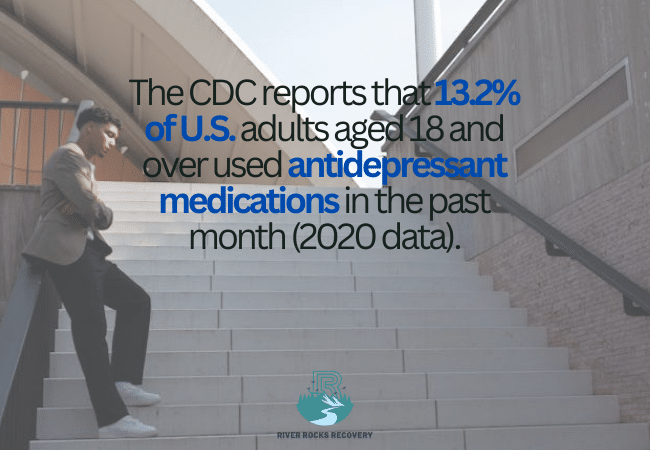Depression is one of the most common mental health conditions, affecting millions of people worldwide. Antidepressants are a cornerstone in the treatment of depression and other mood disorders, offering relief for those struggling with symptoms like persistent sadness, lack of energy, and difficulty concentrating. However, unlike medications for acute conditions, antidepressants take time to work. Understanding how and when antidepressants become effective is crucial, especially for individuals also managing addiction or co-occurring disorders.
At River Rocks Recovery, we understand the importance of combining antidepressant treatment with comprehensive support programs, such as our Addiction Treatment Program, Partial Hospitalization Program, and Sober Living Program, to address the complex relationship between mental health and addiction. This guide dives into the science behind antidepressants, factors that influence their effectiveness, and how professional programs can enhance recovery outcomes.
How Antidepressants Work
Antidepressants influence brain chemistry, particularly neurotransmitters such as serotonin, norepinephrine, and dopamine, which regulate mood, sleep, appetite, and energy levels. They are most commonly prescribed for:
- Major depressive disorder (MDD)
- Anxiety disorders
- Post-traumatic stress disorder (PTSD)
- Obsessive-compulsive disorder (OCD)
- Bipolar depression
While antidepressants are highly effective for many, they are not immediate solutions. Their effects build gradually as neurotransmitter levels stabilize, supporting long-term emotional and cognitive improvements.
The Typical Timeline of Antidepressant Effectiveness
The journey to full antidepressant efficacy involves several stages. Patients should expect gradual changes rather than immediate relief:
- Week 1–2:
During the first two weeks, the most noticeable improvements are often physical. Many patients experience better sleep, increased appetite, or reduced fatigue. However, mood symptoms such as sadness or hopelessness may remain unchanged. - Week 3–4:
Emotional and psychological changes become more apparent during this phase. Patients may notice improved mood stability, reduced feelings of despair, and a slight increase in motivation. These changes can coincide with continued physical improvements. - Week 6–8:
For most individuals, the full therapeutic effects are achieved after six to eight weeks of consistent use. Patients typically report feeling more hopeful, emotionally balanced, and engaged in daily life activities.
If significant improvement is not seen by this stage, a healthcare provider may adjust the dosage, switch medications, or recommend additional therapies.
Factors Influencing Antidepressant Effectiveness
While the timeline outlined above is typical, several factors can affect how quickly and effectively antidepressants work for an individual:
- Type of Antidepressant:
- Selective serotonin reuptake inhibitors (SSRIs) like Prozac or Zoloft are commonly prescribed for their favorable safety profile, but they may take longer to show results.
- Other classes, such as serotonin-norepinephrine reuptake inhibitors (SNRIs) or tricyclic antidepressants (TCAs), may work differently for some individuals.
- Underlying Conditions:
Co-occurring disorders such as anxiety, PTSD, or substance use disorders can complicate the treatment process, necessitating a holistic approach like the programs at River Rocks Recovery. - Medication Adherence:
Consistency is critical. Missing doses or stopping medication prematurely can delay or disrupt progress. - Integrated Therapies:
Combining medication with evidence-based therapies such as Cognitive Behavioral Therapy (CBT) or Dialectical Behavior Therapy (DBT) can accelerate improvement. - Support Systems:
Programs like our Intensive Outpatient Program or Outpatient Treatment Program provide the structured support patients need to stay consistent and engaged in their treatment plans.
The Importance of Holistic Treatment in Mental Health and Addiction
For individuals dealing with both depression and addiction, addressing both conditions simultaneously is essential. Depression often coexists with substance use disorders, creating a vicious cycle where one condition exacerbates the other.
At River Rocks Recovery, we recognize the importance of integrated treatment programs that address the root causes of mental health challenges while supporting sobriety.
- Addiction Treatment Program: A tailored approach to overcoming substance abuse while stabilizing mental health.
- Partial Hospitalization Program (PHP): Provides intensive, structured care during the day while allowing patients to return home at night, balancing rigorous treatment with personal responsibilities.
- Sober Living Program: A supportive environment that fosters accountability, community, and continued growth after primary treatment.
Practical Tips to Maximize Antidepressant Effectiveness
For those starting antidepressants, the following steps can enhance their effectiveness and improve outcomes:
- Consistency Is Key:
Take medications exactly as prescribed. Skipping doses or stopping abruptly can disrupt treatment and lead to withdrawal symptoms or relapse. - Communicate with Providers:
If side effects are severe or progress is slow, talk to your doctor. Adjustments to dosage or medication type may be necessary. - Combine with Therapy:
Medications address brain chemistry, but therapies like CBT or DBT help develop coping strategies, improve communication, and address underlying emotional challenges. - Engage in Holistic Recovery:
Participating in programs like our Drug Rehab Treatment, Opiate Rehab Treatment, and Alcohol Rehab Treatment ensures that mental health is treated alongside any co-occurring addiction issues. - Build a Support Network:
Engage with peers and mentors through programs like our Intensive Outpatient Program or Sober Living Program to create a community of accountability and encouragement.

When to Seek Help
If you or someone you love is struggling with depression, substance abuse, or both, seeking professional help is the first step toward healing. Untreated depression can lead to worsening symptoms, impaired daily functioning, and increased risks of self-medication with drugs or alcohol.
At River Rocks Recovery, our comprehensive treatment programs in Ohio are designed to address both mental health and addiction challenges. From our Addiction Treatment Center to our Outpatient Treatment Program, we provide the tools, resources, and support needed for lasting recovery.
Start Your Recovery Journey Today
Taking the first step toward recovery can be daunting, but you don’t have to do it alone. Contact River Rocks Recovery today to learn more about how our programs, including Addiction Treatment, Partial Hospitalization Program, and Sober Living Program, can support you in achieving a healthier, happier life. Take the first step and contact us today at (888) 905-6281.
FAQ Section: How Long Does It Take for Antidepressants to Work?
What are antidepressants used for?
Antidepressants are primarily prescribed for mental health conditions such as major depressive disorder, anxiety disorders, PTSD, OCD, and bipolar depression. They help stabilize mood by balancing neurotransmitters in the brain.
How long does it take for antidepressants to start working?
It typically takes 4-6 weeks for most antidepressants to show noticeable effects, although some individuals may experience improvements in physical symptoms like sleep or appetite within the first two weeks.
Can antidepressants work faster for some people?
Yes, factors like the type of medication, dosage, consistency in taking the medication, and combined therapies can influence how quickly someone responds to antidepressants.
What should I do if antidepressants aren’t working?
If you don’t notice significant improvements after 6-8 weeks, consult your doctor. They may adjust your dosage, switch medications, or recommend combining medication with therapy.
How do addiction treatment programs support antidepressant effectiveness?
Programs like Partial Hospitalization, Intensive Outpatient Treatment, and Sober Living Programs provide a structured and supportive environment to address co-occurring disorders, helping individuals adhere to their medication and therapy plans.




























